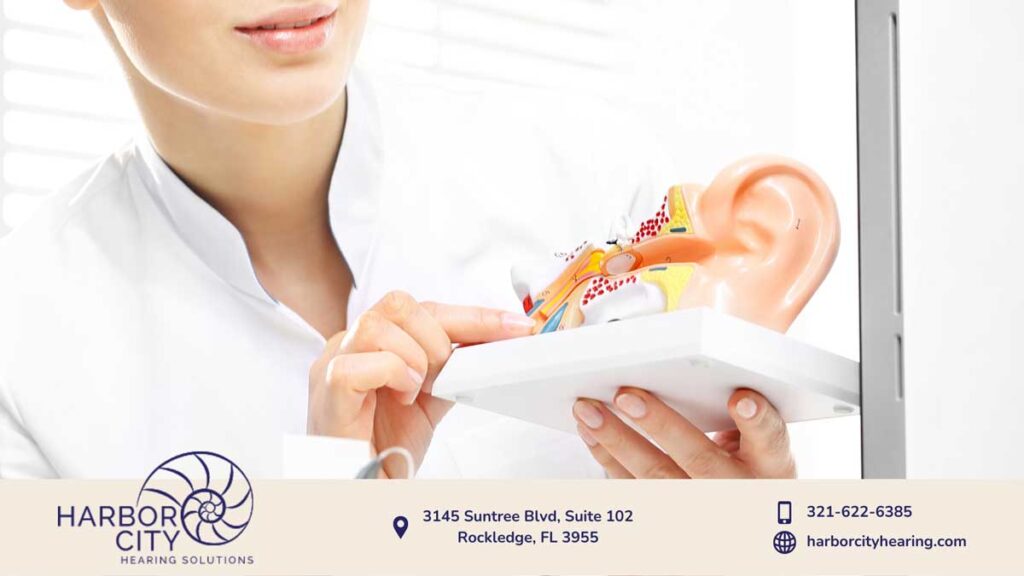When you have hearing problems, one of the first things you should do is determine which type of “hearing doctor” you need. The following are the three primary hearing healthcare professionals:
Audiologists
An audiologist is a qualified and experienced hearing specialist who holds a master’s or doctorate in audiology. An audiologist is a licensed professional who specializes in the diagnosis and treatment of hearing loss, tinnitus, and balance disorders. Audiologists can also address other hearing conditions such as earwax removal and hearing aid fitting.
If you need to consult with an audiologist in Melbourne, FL, please contact Harbor City Hearing Solutions for an appointment.
Otolaryngologists or ENT (Ear, Nose, and Throat) specialists
An ENT, as the name suggests, is a medical doctor who specializes in diseases and disorders of the ears, nose, and throat. ENTs treat conditions affecting the ears, balance system, and base of the skull in terms of hearing. An ENT can provide treatment for ear infections, remove earwax, and operate on patients. When appropriate, an ENT surgeon can also perform cochlear implant surgery.
Hearing Instrument Specialists
Hearing instrument specialists can carry out necessary tests to determine the type and severity of hearing loss. They can also advise and fit their patients with the best hearing aids. Hearing instrument specialists are board-certified and state-licensed professionals who are well-versed in the various types and levels of hearing aid technology.
Audiology as a Branch of Science
“Audiology” refers to the branch of science that deals particularly with hearing. An audiologist is a “hearing doctor” in the most literal sense of the term. An audiologist is a trained hearing specialist who may hold a master’s degree or a doctorate in audiology. A licensed audiologist can diagnose and evaluate hearing loss and provide assessment and treatment for related conditions such as balance disorders, earwax buildup, and tinnitus disorders.
The most common problem that audiologists address is hearing loss. When it comes to hearing loss, a local audiologist is the best option because they can work with you medically all the way; from hearing aid fitting to maintenance and repair if necessary. Audiologists ensure the best possible continuity of care.
Some audiologists specialize in balance disorders, while others focus on hearing aids and cochlear implants. When you have hearing loss, an ENT or general practitioner can assist you with the medical components of the issue but may usually refer you to a hearing instrument specialist or audiologist. The benefit of seeing an audiologist is that they can diagnose the problem, assist you in finding the appropriate hearing aid when one is required, and then provide support as you become familiar with the new device. Audiologists can also provide periodic fittings and adjustments.
The Role of an ENT
An ENT will only treat the medical problems of the underlying hearing loss or clogged ear. ENTs can assist in the resolution of the medical issue, but they will not provide assistance when it comes to fitting and adjustment of hearing aids.
If you have sinus issues, earwax buildup, chronic ear infections, tinnitus, ear pain or discharge, or other problems affecting the ears and other organs, visiting an ENT is an ideal choice. ENTs also perform surgeries such as cochlear implantation, ear tube placement, and sinus surgery, which can significantly help clear up problems in the ear, nose, and throat. However, if counseling and/or hearing aids are required, the patient will most likely be referred to an audiologist or hearing instrument specialist.
Which is the best “hearing doctor”?
There are numerous options for selecting a hearing doctor, with expertise and scope of practice as vital points to consider. Finding someone who is trustworthy, approachable and compassionate should also be non-negotiables.
Make sure that the doctor you choose can address your specific type of hearing concerns. For example, if you have excessive earwax and need to have your ears cleaned on a regular basis, an ENT can help. ENTs can also help you if you need a surgery or if you have related sinus issues. Meanwhile, if you need a long-term hearing solution, such as a hearing aid or personal amplification device, an audiologist is the ideal option to provide ongoing hearing health care.
Basic differences
ENTs can address the following concerns:
- Ear pain, infection, or discharge
- Balance problems
- Changes in your hearing
- Clogged ears
- Surgery on structures on the head or neck including tubes in your ears or cochlear implants
- Other concerns with your ears, nose, or throat
Audiologists or “hearing doctors” can address the following concerns:
- Hearing loss
- Ringing in the ears (tinnitus)
- Earwax buildup
- Pediatric hearing loss
- You want to purchase hearing aids
- Maintenance or adjustments of hearing devices
- Aftercare and programming of cochlear implants
Hearing Instrument Specialists can offer the following services:
- Provide assistance in hearing aid purchases
- Repair damaged hearing aids
- Perform hearing tests
Hearing Doctors or Audiologists in Melbourne, FL
One of the factors to consider when looking for the best hearing doctor or audiologist is their credentials. The credentials of hearing healthcare professionals vary; some are board-certified, while others are state-licensed.
At Harbor City Hearing Solutions, you will be seen by a highly experienced Doctor of Audiology who will listen to your needs, assist you in selecting the right device, and fit the hearing aid(s) using industry best practices, in addition to providing regular follow-up care.
If you need hearing aids in Melbourne, FL, Dr. Liz White is an experienced audiologist who will provide you with personalized hearing solutions. so that you or your loved one can enjoy a better quality of life and rise above hearing loss.
Make an appointment with us today!



